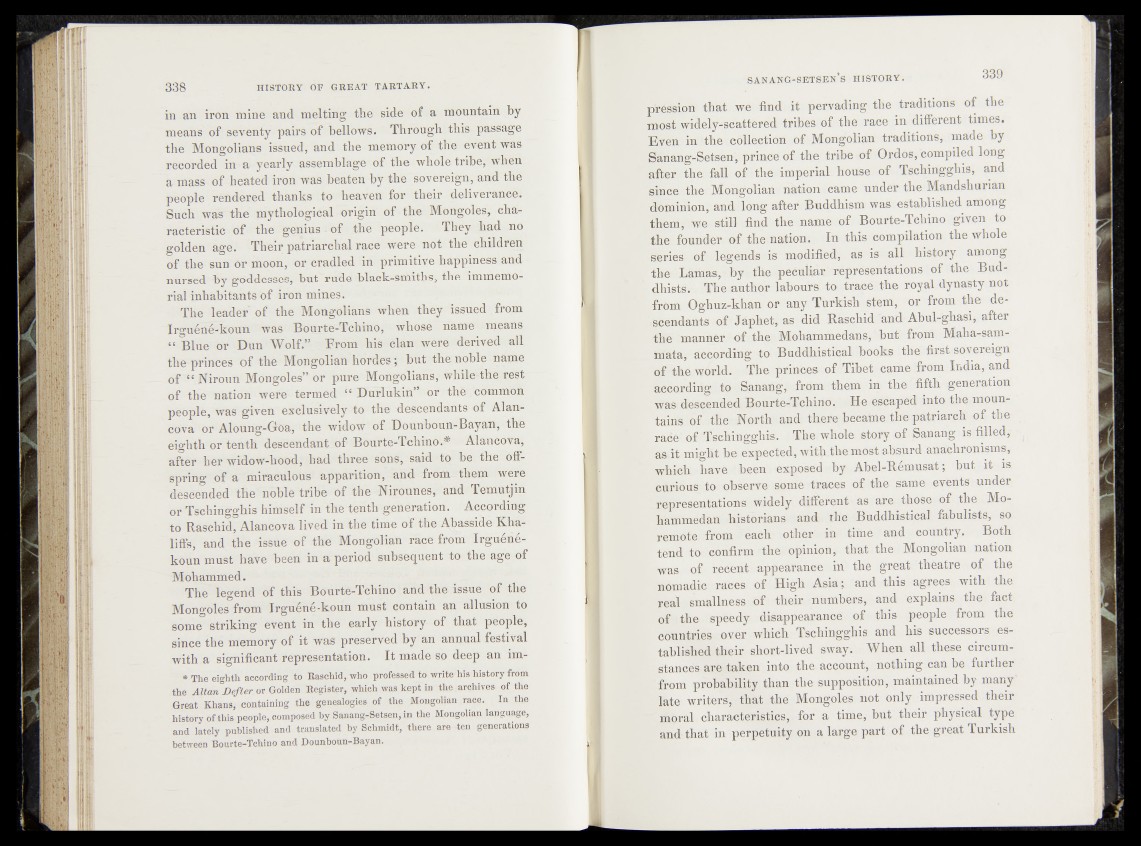
in an iron mine and melting the - side of a mountain by
means of seventy pairs of bellows. Through this passage
the Mongolians, issued, and-the memory of the event was
recorded in a yearly assemblage of the whole tribe; when
a mass of heated iron was beaten by the'sovereign, and the
people rendered thanks ta^heaven for their deliverance.
Such was the mythological origin of the Mongoles, characteristic
of the genius ; of the people. They had no
golden age. Their patriarchal race were-not the children
of the sun Or moon, or cradled in primitive happiness^and-
nùrsed by goddesses, but rude black-smiths, the immemo;
rial inhabitants of iron mines';
The leader of the Mongolians whin they#ssiied /from
IrguétM-koun was Bourte-Tchino, whose namre: ^mçans
« Bldd» or Dun Wolf.” From his clan wéfë^d%rïv>e'd all
the-princes rbf the Mongolian hordes ; but the noble «.name
of “ Niroun MorigólêS*? or pure M ongolî ans? rest
of the nation were'- termed “ DifflukMa^br thé Common
people, was given exclusively t a the descendante of Alâïr-
cova or Aloung-Goa, the widow of Dounboun-Bayan.,- thé
eighth or tenth descendant of Bourte-Tchino.* Alancova,
after her widow-hood, had three sons, said to be the -offspring
of a miraculous' apparition*!; and from^-them- werp
’descended the noble tribe of the Nirounés^ and Temutjin
or Tschingghis himself in the ten th generation. - Accordinf
to Raschid, Alancova lived in the time of the^^S#ide*Kha-
liffs, and the issue of the Mongolian race from Irguené-
kóun must have been in a period subsequent to the age of
Mohammed.
The legend of this Bourte-Tchino and the issue of the
Mongoles from Irguéné-koun must contain an allusion to
some striking event in the early history of that people,
since the memory of it was preserved by an annual festival
with a significant representation. It made so deep an im-
* The eighth according to Raschid, who professed to write-his history from
the Altan Defter, or Golden Register, which was kept in the .archives of the
Great Khans,- containing the genealogies of the Mongolian ;race. In the
history óf this people, composed by Sanang-Setsen, in the Mongolian language,
and lately published and translated by Schmidt, there are ten generations
between Bourte-Tchino and Dounboüh-Bayan.
SANAJÎG-SETSEÎS’S HISTORY. 339
préssion that we find it;‘ pervading the traditions of the
most widely-scattered tribes of the race in different times.
Even in Ithe’.collection of Mongolian traditions, made by
Sanang-Setsen', prince of the tribe of Ordos, compiled long
after the: fall of the imperial house of Tschingghis, and
since the Mongolian nation came under the Mandshurian
dominion,* and long after Buddhism was established among
them, we still find themame ©f* Bourte-Tchino given to
the founder of the-nation. In this compilation the whole
series^ .off^tegeidds-is modified, as is all history among
the Lamas, •>:% the pecuÜar' rèprésehtations^ of the Bud-
- dhists;-'; -Thebiithor labours-ta tracé, the .royal dynasty not
from Ogbbz-khan or any Turkish stem, or from the defendants
of Japhet,-as did Ràschid 'and Abul-ghasi, after
the manner of; the Mohammedans,Ébut' from Maha-satn-
mata, according to Buddhistical fhooks the first sovereign
ofthe.wôrld. The p rin c e of Tibet came from India, and
accordiugr^to Sanang, from them* ijè thèbfifth generation
was- descended, Bourte-Tchino. He Reaped into the moun-
|%'àm^'^St’he^N orth and there?became th ©patriarch of the
race' of'Tschingghis. The whole story of Sanang »is filled,-
as.it might be expected," with.the m,Ost absurd anachronisms,
which have heemy exposed -by-.Abeb-Remusat ; but it is
curious to observe some traces of the same*> events under
representations: -widely- different- as are fhoseyof the - Mohammedan
sh^storians and- the Buddhistical fabulists, so
remote from \iach1 other in time and country. Both
-to confirm the opinion, that the Mongolian nation
was of recent appearancej&m the great théâtre of the
nomadic -races of High Asia; and this agrees with the
real smallness, of their- numbers, and 'explains the fact
of the spëédy disappearance^^ this people from the
countries over which Tschingghis and his successors established
their short-lived swayt When all these circum-
|* stances, are taken into the account, nothing can be further
from probability;than-thaSupposition, maintained by many'
late-writers, that the .-Mongoles not only impressed their
*■- moral characteristics,- for a time, but their physical type
and- that in perpetuity on a large part of the great Turkish